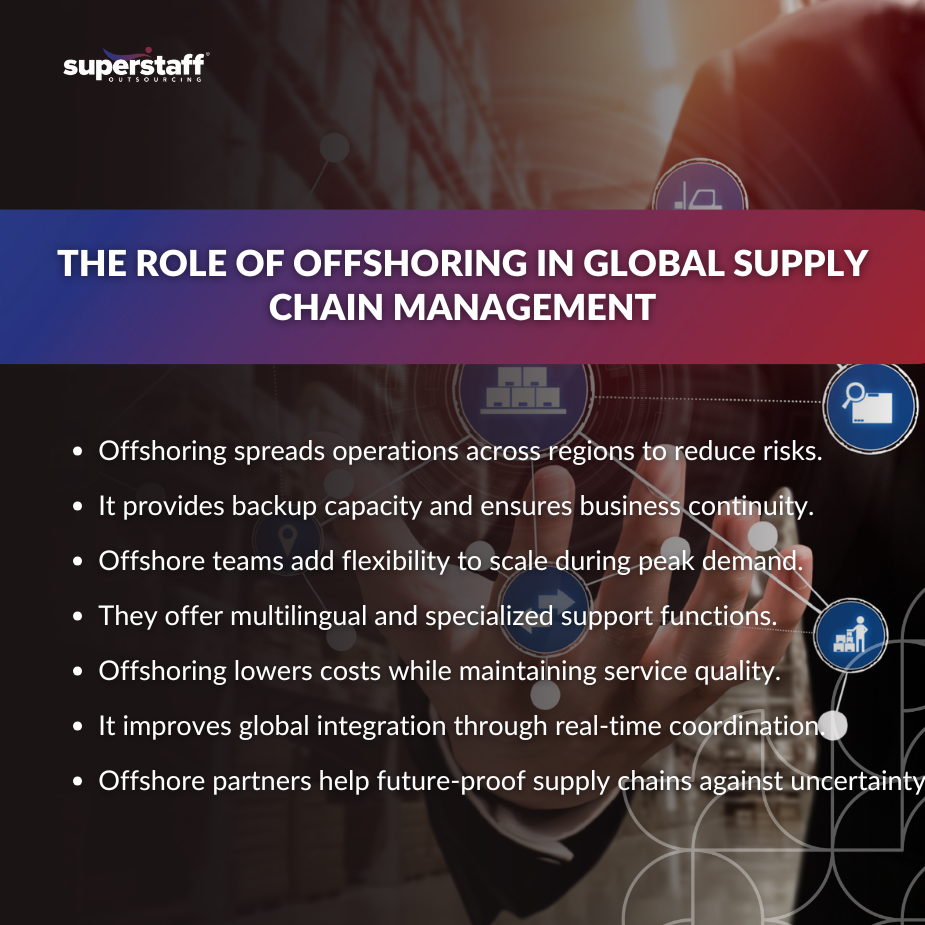
Global supply chains are under more strain than ever before. From geopolitical tensions and shifting trade policies to natural disasters and labor shortages, disruptions have become a constant threat rather than a rare exception. For businesses competing in a hyperconnected world, these pressures highlight the fragility of relying solely on local operations.
To remain competitive, organizations are looking beyond traditional solutions and exploring new ways to strengthen resilience. This is where offshoring comes into play. By blending the responsiveness of local teams with the scale and flexibility of international support, companies can create a more balanced and durable approach to global supply chain management.
Offshoring is no longer just about cutting costs; it’s about ensuring stability, agility, and continuity when faced with unexpected challenges. In this blog, we’ll explore how offshore partnerships empower businesses to manage risks, adapt quickly to changing conditions, and build the resilience needed to thrive in today’s unpredictable global landscape.
The Fragility of Global Supply Chains
Supply chains are more vulnerable today than ever, from shipping bottlenecks to policy shifts. The COVID-19 pandemic revealed how dependent industries had become on global production networks, with delays in one region rippling across multiple markets. Factories shuttered in Asia, ports clogged in the United States, and raw materials shortages in Europe all collided to create chaos. Even as economies reopened, businesses faced unprecedented backlog and inflationary pressure.
Tariff wars have compounded the challenge, adding new layers of unpredictability to cross-border trade. The imposition of sudden duties on steel, semiconductors, or agricultural goods disrupted planning and forced companies to rethink sourcing strategies. For firms operating on tight margins, these shocks quickly escalated into operational crises.
At the same time, shortages of critical raw materials such as lithium and rare earth minerals continue to put pressure on manufacturers, especially in industries like technology, healthcare, and automotive. Rising costs, unpredictable delays, and lack of contingency planning have left businesses scrambling.
These vulnerabilities are pushing organizations to explore offshore supply chain strategies as a buffer. Companies must recognize that resilience in global supply chain management requires spreading risk across borders instead of concentrating operations in one place.
Why Onshore Teams Alone Aren’t Enough
Depending solely on local operations can expose companies to concentrated risks. A business with manufacturing or service hubs in a single country may enjoy efficiency in the short term but is left dangerously exposed when that region faces disruption. Political unrest, natural disasters, or sudden regulatory changes can bring operations to a standstill overnight.
Take, for example, companies with heavy reliance on one geographic hub for production. A flood, earthquake, or labor strike in that area could immediately halt production, cut off suppliers, and strain customer relationships. The result: lost revenue, reputational damage, and weakened customer trust.
Local teams are invaluable for maintaining a strong on-the-ground presence, but they also face constraints. Scalability is limited by regional workforce availability. Cost pressures mount when competition for skilled labor drives wages higher. And without redundancy across multiple regions, companies lack the flexibility to reroute operations during a crisis.
This reality underscores a critical point in global supply chain management: resilience cannot rely on local capacity alone. Offshoring diversifies risk by extending operations beyond borders and creating backup systems that support continuity.

Why Companies Offshore Supply Chain and Logistics Operations
Offshoring strengthens resilience by spreading operations across geographies. Instead of having all operations tied to one region, companies can leverage offshore teams to ensure continuity when disruptions arise. This strategy is particularly effective in industries where continuous service and support are mission-critical.
Countries like the Philippines and Colombia have become trusted offshore destinations, offering not just cost advantages but also strong infrastructure and a skilled workforce. When U.S.-based businesses face natural disasters, economic downturns, or labor shortages, offshore teams can step in to provide backup capacity.
By diversifying geographically, companies avoid single points of failure. Offshore teams can provide 24/7 coverage across time zones, ensuring that operations don’t stop when local offices close. For example, a logistics company may rely on offshore support centers in Colombia for real-time track and trace functions while its U.S. offices sleep. Similarly, healthcare providers can maintain around-the-clock claims processing through offshore teams in the Philippines.
This type of resilience goes beyond cost savings. It reduces single-point-of-failure risks, provides redundancy, and enhances stability—key goals in modern global supply chain management.
Boosting Agility and Responsiveness Through Offshore Support
Offshoring also allows companies to adapt quickly to fluctuating demand. In a world where consumer expectations shift rapidly and market disruptions can appear overnight, agility is a competitive advantage. Offshore teams provide the flexible staffing models businesses need to scale up or down without long-term overhead costs.
Retailers, for example, often see customer inquiries spike during the holiday season. Instead of overstaffing locally for just a few months, businesses can ramp up offshore teams to handle the surge. Once peak demand subsides, operations can scale back smoothly.
Beyond staffing, offshore teams bring multilingual capabilities that support global markets. A customer in Mexico may expect Spanish-language support, while another in Europe may prefer English, German, or French. Offshore call centers in Colombia and the Philippines are equipped to provide this multilingual customer experience, strengthening relationships and improving satisfaction.
Specialized back-office functions further enhance agility. Whether it’s supply chain analytics, vendor management, or logistics documentation, offshore support allows businesses to stay ahead of disruptions. Agility is crucial, but cost-effectiveness is another driver—and this is where offshoring shines as part of global supply chain management.
Cost Efficiency Meets Operational Strength
Offshoring helps companies maintain margins while strengthening supply chains. Rising inflation and competitive markets leave little room for error, making cost efficiency an essential component of resilience. Offshore teams provide access to high-quality talent at a fraction of domestic labor costs, enabling businesses to keep expenses under control without compromising service quality.
Balanced budgets allow companies to reinvest in innovation, technology, and process improvements. Instead of being consumed by rising overhead, savings can be redirected to enhance supply chain visibility, adopt AI-powered forecasting tools, or develop more sustainable sourcing practices.
The key here is not simply cost-cutting but creating a balance between affordability and operational strength. Offshore teams act as an extension of local operations, delivering the same quality and reliability while improving financial resilience. This makes offshoring a smart strategic choice for organizations navigating the complexities of global supply chain management.
In addition to cost and efficiency, offshoring improves global integration, allowing companies to coordinate seamlessly across regions.
Building Globally Integrated Supply Chain Operations
Offshore teams create seamless links across global supply networks. In today’s business environment, integration is as important as diversification. Offshore hubs are no longer just backup centers; they are active participants in global operations.
Digital tools such as cloud-based platforms, AI-driven analytics, and real-time communication apps allow offshore and local teams to work as one. For example, a supply chain disruption detected in Asia can be addressed in real time by an offshore team in Colombia, ensuring continuity of service and proactive communication with clients.
Offshore hubs also provide specialized logistics support. From coordinating proof of delivery to managing vendor relations, these teams handle time-intensive processes that often overwhelm local staff. By leveraging their expertise, businesses can streamline operations and focus local teams on strategic initiatives.
Cross-border coordination becomes more efficient when offshore partners are fully integrated into the company’s structure. The result is a more transparent, agile, and globally aware supply chain operation—an essential component of modern global supply chain management.
These benefits also position offshoring as a long-term strategy rather than a stopgap measure.
Offshoring’s Role in Future-Proofing Supply Chains
The future of supply chain management will depend on balancing local presence with global support. As risks evolve, businesses must prepare for disruptions we can predict, such as climate-related events and regulatory changes, as well as those we cannot. Offshore teams provide the flexibility to navigate both.
Offshore partnerships also support sustainability goals by enabling more efficient global coordination. For example, offshore teams can optimize logistics to reduce unnecessary shipments, cutting both costs and carbon emissions. By embedding sustainability into operations, companies not only meet regulatory requirements but also strengthen brand reputation.
Leveraging global talent ensures companies are prepared for the next generation of supply chain challenges. Offshore teams bring specialized skills in data analytics, AI, and logistics management that are increasingly vital in a digital-first economy. By integrating these capabilities, businesses can future-proof their operations and remain competitive.
Ultimately, the path forward in global supply chain management is about synergy between local and international capabilities. Offshore teams provide the balance that companies need to thrive amid uncertainty.
Strengthen Global Supply Chain Management Through Offshoring
Offshoring isn’t just about cutting costs—it’s about strengthening global supply chain resilience. In an era of volatility, businesses cannot afford to depend solely on local operations. By diversifying risks, boosting agility, reducing costs, and building integrated systems, offshoring equips organizations to weather disruptions and emerge stronger.
From retail and logistics to healthcare and technology, companies that embrace offshore strategies gain a strategic advantage in global supply chain management. They can respond faster, scale smarter, and maintain continuity when it matters most.
Understanding global logistics outsourcing trends should only be the beginning. For organizations seeking stability in uncertain times, partnering with an experienced offshore provider is the next step.
At SuperStaff, we help businesses fortify their supply chain strategies with reliable offshore teams in the Philippines and Colombia. Contact us today to explore how we can support your journey toward resilience and long-term growth.






